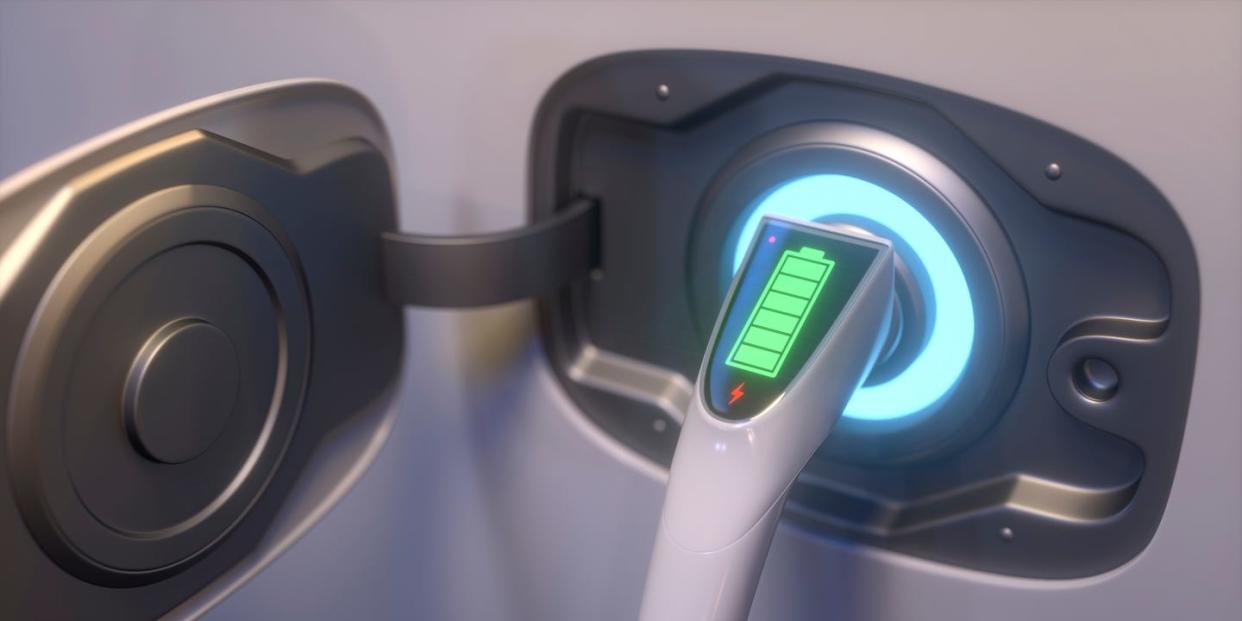How Much Does It Cost to Charge an Electric Car?

"Hearst Magazines and Yahoo may earn commission or revenue on some items through the links below."
Gas prices have skyrocketed in recent months, leaving people wondering if electric cars are a cheaper option.
It’s tricky to say which is better, because the costs of charging an electric car aren't the only factor you should consider.
The stand-alone cost of charging your electric car battery is is currently cheaper for now, but that may change.
The skyrocketing cost of gasoline has Americans justifiably concerned. Yet, along with petroleum, electricity prices are on the rise too. While the present cost of charging an electric vehicle (EV) is cheaper than filling a tank with gasoline, that doesn’t make an EV cheaper than a traditional car.
🚗 Want to keep up with the latest car advice? Join Pop Mech Pro.
Electricity prices have been on the rise for a while. Last year the U.S. Energy Information Administration (EIA) reported that the average nominal price increased 4.3 percent in 2020 to $0.1372 per kilowatt-hour (kWh) in 2021. It’s expected to reach $0.1426 per kWh in 2022. “That $0.1372/kWh price is the highest on record," the EIA noted last year.
Unfortunately, we’ve already beaten that record. As of early May, electricity costs on average 14.5 cents per kWh. As with gasoline, prices vary regionally. The residential cost of a kilowatt-hour is higher in populous areas of the country. Here are a few regional examples of cost:
17.8 cents per kWh in the mid-Atlantic
18.07 cents per kWh in the Pacific
24.8 cents per kWh in New England, according to short term data from the EIA.
How to Figure Out Your EV Charging Cost
Kelley Blue Book (KBB) recently explained the math behind figuring out your EV charging cost. Start with a recent electric bill to calculate the amount you pay for electricity in a given month. For home charging, divide the number of kilowatt-hours you used into the bottom-line dollar total. The resulting figure is the price you paid per kWh.
According to KBB, the average efficiency of an electric car is about three to four miles per kWh. Dividing the total miles you drive per month by three, for example, yields the kWh your car would use monthly. Multiply that number by your cost per kWh and you’ll have your monthly charging bill.
The average American drives about 1,183 miles per month according to the Federal Highway Administration. At that mileage, an EV would use about 394 kWh monthly. At the current average of 14.5 cents per kWh, the cost to charge an EV per month works out to $57.13.
How Much Does it Cost to Drive a Gas Fueled Car?
Meanwhile, AAA reports the national average price of a gallon of regular unleaded at $4.58 at the time this article was published. As of 2019, the average midsize car (which most closely correlates to the average EV vehicle type) achieved 33 to 34 mpg. To travel the 1,183 mile average, the average midsize car would consume approximately 34 gallons, which works out to a monthly fuel bill of about $159 at current prices.
How Do EV’s and Gas Fueled Cars Compare?
At a glance, that seems a bargain in favor of EVs.
However we can’t ignore the fact the average price for a new car (including EVs and therefore skewing high) in early 2022 was $46,426, according to Edmunds, while the average price of a new EV is $74,522 according to stats from Inside EVs. The average $28,096 difference in price per car means you’ll have to drive many, many miles to recoup the purchase price in kilowatt-hour savings.
Undoubtedly, some will point out that the $7,500 federal tax credit for EVs marginally alters the equation, but that doesn’t make EVs less expensive. It just means your fellow Americans are subsidizing the cost, which comes back to us in taxes
In addition to the above, there’s the fact that EVs cost on-average more to insure, and their battery packs tend to be shorter lived (about 10 years, 65,000 miles) and cost more to replace (approximately $10,000) than a combustion engine.
The time it takes to recharge an EV (six to seven hours with a level 2 home charger, 30-40 minutes for an 80 percent charge on a DCV fast charger) might also be factored in as opportunity cost, not to mention the cost of installing a 240 volt charging solution in your home.
A caveat to all of this is the inherent variability in all of these numbers. They apply to the current, artificially high cost of gasoline. If prices simmer down again, the per gallon cost could return to what it was as recently as 2020—when it reached a high of $2.25.
Given that just 2.5 percent of cars in the U.S. are now EVs, any theoretical switch to a fully national, electrified fleet would logically drive the cost of electricity up by orders of magnitude. The stand-alone cost of charging your EV battery is cheaper for now, but it’s a moving target.
You Might Also Like

